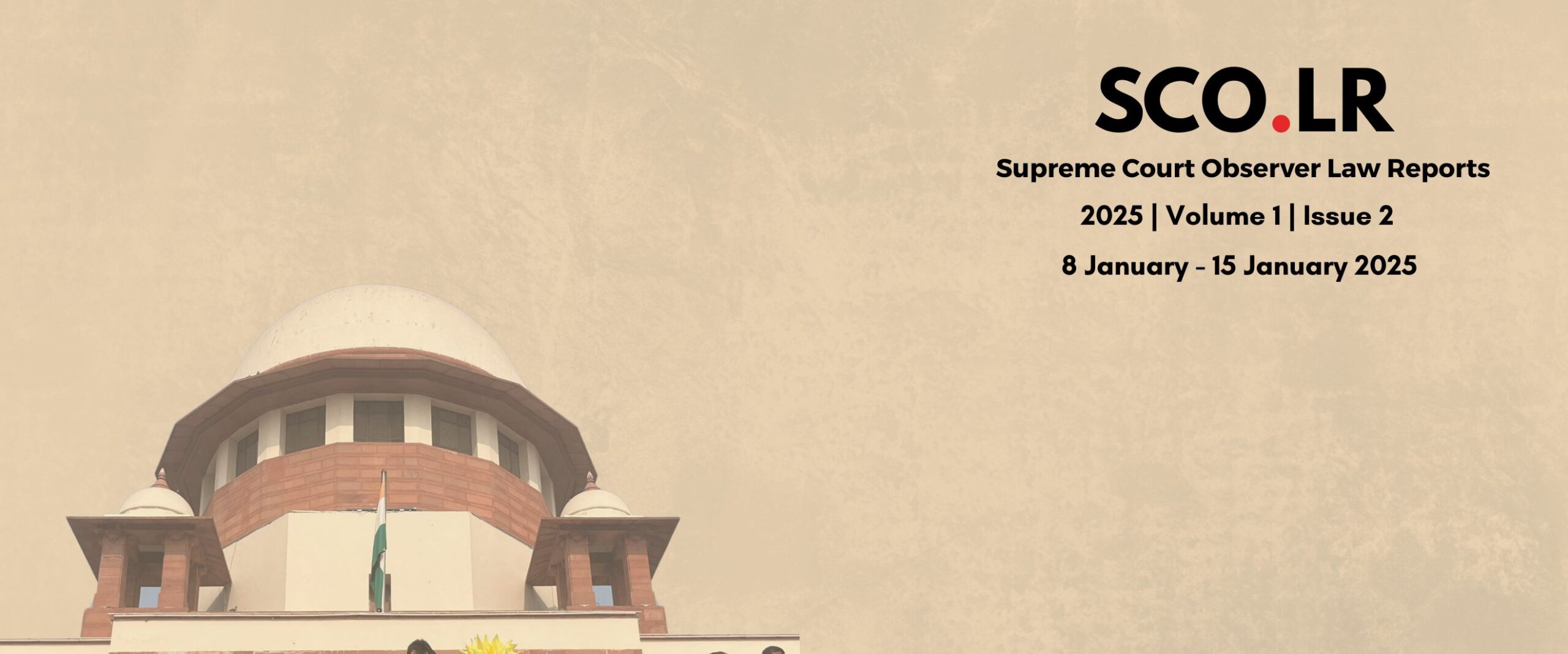Analysis
SCO.LR | 2025 | Volume 1 | Issue 2
In this edition of SCO.LR, we summarise five significant and unmissable judgements from 7 January to 15 January 2025

This month, we launched the Supreme Court Observer Law Reports (SCO.LR). SCO.LR (pronounced ‘scholar’) curates, summarises and presents five significant judgements each week.
The first edition covered decisions from the first week of April 2025. But we want SCO.LR (along with our Case Archive) to be a more complete resource on the Supreme Court for you. To achieve this, we will be releasing back issues from January to March 2025 to complete the annual set. So here we are, presenting Volume 1 Issue 2 of SCO.LR, which covers cases from the second week of January 2025.
Stay tuned for more updates on how SCO.LR can support your research. Do share feedback to help us build the most accurate and accessible archive of the Indian Supreme Court!
**********
The Supreme Court Observer Law Reports
2025 SCO.LR | Vol 1 | Issue 2
8 January – 15 January 2025
**********
Death Penalty for Juvenile Offenders
Om Prakash @ Israel @ Raju @ Raju Das v Union of India
8 January 2025
Citation: 2025 INSC 43 | 2025 SCO.LR 1(5)
Bench: Justices M.M. Sundresh and Aravind Kumar
The Supreme Court overturned a life sentence after finding that the accused was a juvenile at the time of the crime.
The accused argued that the lower courts had failed to recognise his juvenility. The Supreme Court condemned these lapses, stressing that juvenile claims can be raised at any stage of proceedings under Section 9(2) of The Juvenile Justice Act, 2015.
The Court reaffirmed the importance of proper age determination in criminal trials and stressed that overlooking juvenility violated constitutional protections under Articles 14 and 21.
Key words/phrases: The Juvenile Justice Act, 2015—section 9—juvenile rights—death sentence—age determination in criminal trials
Read the Judgement here.
**********
Online Railway Ticket Fraud
Inspector, Railway Protection Force v Mathew K Cherian
9 January 2025
Citation: 2025 INSC 51 | 2025 SCO.LR 1(7)
Bench: Justices Dipankar Datta and P.K. Mishra
The Court ruled that Section 143 of The Railways Act, 1989, which penalises unauthorised ticket procurement and sale, includes tickets bought and sold electronically.
Mathew K. Cherian created fake IRCTC user IDs to buy and sell tickets illegally. The Kerala High Court quashed the case, deeming Section 143 outdated in the e-ticket era. J. Ramesh, an authorised IRCTC agent, was accused of issuing e-tickets via multiple IDs.
The Supreme Court reinstated charges against Mathew, affirming that unauthorised e-ticket procurement is an offence, but quashed charges against Ramesh, holding that Section 143 does not criminalise the use of multiple user IDs by authorised agents.
Key words/phrases: The Railways Act, 1989—section 143—unauthorised e-ticket sales—IRCTC fraud
Read the Judgement here.
**********
Valid Record of Arbitration Agreement
State of Uttar Pradesh v R.K. Pandey
9 January 2025
Citation: 2025 INSC 48 | 2025 SCO.LR 1(8)
Bench: CJI Sanjiv Khanna, Justices P.V. Sanjay Kumar and R. Mahadevan
The Supreme Court set aside two ex-parte arbitration awards against the state of Uttar Pradesh, citing the lack of a valid arbitration agreement under the Arbitration and Conciliation Act, 1996.
R.K. Pandey, a retired lab assistant of a Kanpur hospital, challenged his retirement age in the Allahabad High Court, which directed him to file a representation, which was subsequently rejected. In 2008, he unilaterally appointed arbitrators based on an alleged 1957 agreement between the hospital administrator and the state Governor, and obtained ex-parte awards without notifying the state.
The Supreme Court found no record of the agreement, ruled the arbitration a “sham”, and dismissed the awards and execution proceedings.
Key words/phrases: The Arbitration and Conciliation Act, 1996—invalid arbitration agreement—unilateral arbitration appointment—ex-parte awards annulled—violation of natural justice
Read the Judgement here.
**********
Maintenance Despite Restitution of Conjugal Rights
Rina Kumari @ Rina Devi @ Reena v Dinesh Kumar Mahto @ Dinesh Kumar Mahato
10 January 2025
Citation: 2025 INSC 55 | 2025 SCO.LR 1(9)
Bench: Chief Justice Sanjiv Khanna and Justice P.V. Sanjay Kumar
The Supreme Court held that a restitution of conjugal rights decree does not absolve a husband from paying maintenance under Section 125 of the Code of Criminal Procedure (CrPC), if the wife has valid reasons to live separately.
Rina Kumari married Dinesh Kumar Mahto in 2014 but left in 2015, citing cruelty, dowry demands and lack of basic amenities. In 2018, Dinesh secured a restitution decree. Rina later filed a dowry harassment case and sought maintenance, which the Dhanbad Family Court allowed. But the Jharkhand High Court quashed the maintenance order, citing Rina’s non-compliance with the restitution decree.
The Supreme Court reversed the High Court’s ruling and restored the Family Court’s maintenance order.
Key words/phrases: Section 125 CrPC and maintenance rights—women’s rights to financial support—restitution of conjugal rights not absolute—judicial protection against marital cruelty
Read the Judgement here.
**********
Inclusive Sanitation in Court Complexes
Rajeeb Kalita v Union of India
15 January 2025
Citation: 2025 INSC 75 | 2025 SCO.LR 1(10)
Bench: Justices J.B. Pardiwala and R. Mahadevan
The Supreme Court affirmed access to sanitation as a fundamental right under Article 21, and directed all high courts, state governments and Union Territories to ensure basic toilet facilities in court complexes.
Rajeeb Kalita had filed a PIL under Article 32, highlighting inadequate sanitation in courts and tribunals nationwide, particularly for women, transgender individuals, and specially-abled persons.
The Supreme Court emphasised the state’s duty under Articles 47 and 48A to improve public health and sanitation. It mandated the construction, maintenance, and accessibility of toilets for all court users and directed high courts to form committees for implementation and report compliance within four months.
Key words/phrases: Article 21—sanitation as a fundamental right—PIL on inadequate toilet facilities—state’s duty under Articles 47 and 48A—mandate for inclusive toilets in courts and tribunals
Read the Judgement here.
**********
This edition of SCO.LR was compiled by Manasi Shah